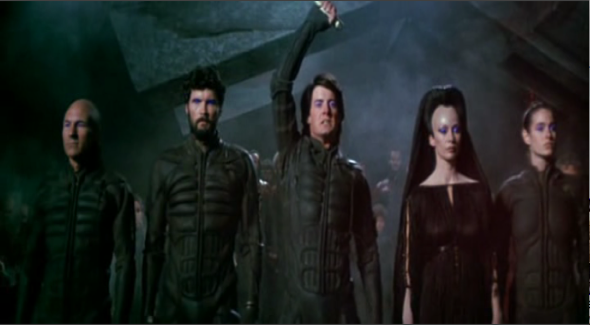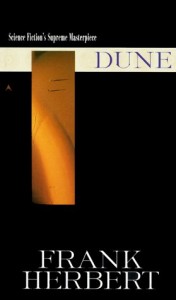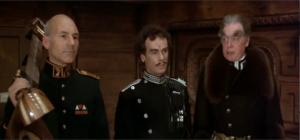[In this new series, Overthinking It writer John Perich dissects the “high-concept train wrecks” of the early 80s. These big vision monstrosities, known for their weird music and kitschy style, left their stamp on the first half of the decade. John takes a look at these cult classics, from birth to termination, and their impact on pop culture.
The following entry contains SIGNIFICANT SPOILERS, so don’t read on if you’re really curious.]

What Is It
Dune, the 1984 David Lynch adaptation of the 1965 Frank Herbert sci-fi novel.
The Big Idea
Ten thousand years in the future, the Atreides, the most honorable noble family in the Galactic Empire, take colonial governorship of the planet Arrakis. Arrakis is the only planet in the galaxy which produces the spice melange, which extends life, enhances awareness and grants prescience. The Atreides are sacrificed as pawns in a scheme between the Emperor and their rivals, House Harkonnen. The Atreides’ son and heir, Paul, flees into the desert, where he becomes a religious leader to Arrakis’ natives.
Why It Showed Promise
-
David Lynch. Though he had nothing under his belt but Eraserhead, The Elephant Man and a few unseen student projects at the time, the critical buzz around him grew every day. If anyone could handle Frank Herbert’s bizarre vision of blue-eyed prophets, giant sandworms and baroque galactic empires – without merely cribbing George Lucas, which was something of a cottage industry in 1984 – it was Lynch.
-
Dino de Laurentis. The infamous Italian producer had a history of big budget spectacles – bombs when they failed, but gems when they succeeded. Lots of people thought of Dino (by 1984) as the man who brought us Waterloo, Mandingo and the terrible King Kong remake. But he was also the executive producer of Serpico, Death Wish, Three Days of the Condor, Ragtime and The Dead Zone – all critical darlings. Think of him as you would Christopher Walken: though he’s no guarantee of quality, you can’t say he lacks style.
-
Dune itself. Thanks to Star Wars, the early 80s were a field day for big budget sci-fi. But where Lucas’s films were a pastiche of Japanese mythology, spaghetti western and one film nerd’s marble notebooks, Dune is … well, it’s Dune.
A full discussion of the merits of Frank Herbert’s masterpiece deserves its own Overthinking It post, or a Fenzel-level tangent. Suffice it to say: Dune is the great science fiction novel of the last century. Dune is about identifying with one’s family, the games people play in politics, the role of religion in shaping culture, the semiotic bonds of language, how resource rushes change a society, coming to grips with mortality, opening the doors of perception, life, death, space, time and love. It’s about the human experience on every level.

Where It Goes Off The Rails
Ah, hell.
-
The acting. Everyone in the movie either chews the scenery like it’s gingerbread or mumbles.
The best example: the scene where Thufir Hawat, Dr. Yueh and Gurney Halleck interrupt Paul Atreides while he’s studying. Hawat (Freddie Jones) blurts his lines like he’s waking up from a nap. Every time he tries to act sincere it comes out stiff, culminating in an odd chop to Paul’s shoulder that’s supposed to be fatherly. Yueh (Dean Stockwell, later of Beverly Hills Cop 2 and Quantum Leap) clearly just dropped a quaalude, as he can barely open his mouth wide enough to deliver his dialogue. And Gurney (Patrick Stewart) berates Paul for not taking his knife practice seriously, then draws a knife of his own, holding it like a TV remote.

And these are good actors, too.
Of course, they’re not the only example. Baron Harkonnen manages to scream without moving his mouth. His son Feyd (played by Sting in all his cod-pieced glory) struts around with a mad leer but nothing else by way of characterization. And Lady Jessica spends most of the film sobbing. Perhaps the longer cut of this film (see below) had greater variety in their performances. But what we’re left with would shame a soap opera.
-
The writing. And the dialogue these poor men have to deliver isn’t much better. Lynch tries to cram as many of Herbert’s bizarre concepts as he can into a few weary scenes. As a result, the first twenty-five minutes of the film are pure exposition. It’s a pure data dump.
And it’s not even artfully arranged. Consider the aforementioned Atreides briefing scene.
PAUL: Things have been so serious here lately.
GURNEY: Soon we leave for Arrakis. Arrakis is real; the Harkonnens are real.
PAUL: Dr. Yueh, do you have any information on the worms of Arrakis?That’s exactly how it plays out – changing from one topic to the next without so much as a segue.
The poor pacing doesn’t help the writing, either. Lynch leaves himself about forty-five minutes to portray two-thirds of the novel: Paul coming to power amongst the Fremen warriors, meeting and falling in love with Chani, teaching them the “weirding way” and leading them to rebel against the Harkonnen and the Empire. He shortcuts a lot of burdensome storytelling by simply narrating what happens. One moment, the Fremen are tentatively accepting Paul and Jessica in their midst; the next, Paul and Chani are making out in an underground corridor. “I love you, Chani,” mumurs a Kyle Machlachan voice-over. Good to know!
-
The setting. Herbert’s chief strength, the intricate weirdness of his setting, is also one of the movie’s great weaknesses. If you don’t believe me, sit down with a friend who’s never read the novel before and watch the movie up to this scene:
http://www.youtube.com/watch?v=M1WNbCjM344
I did. And then, off of her confused look, I had to explain.
“See,” I began, “thousands of years ago, there was a war against the robots. All robots and computers were destroyed. So now there’s a special profession of people who think like computers. They’re called Mentats. That guy with the fluffy eyebrows who chopped Paul on the shoulder? He was a Mentat, too.”
“And when did the movie explain that?”
“It didn’t.”
-
The … um. Complaining about nightmarish scenes from the director of Eraserhead, Blue Velvet and Twin Peaks might seem naive, but Lynch takes it to new levels with Dune. The sci-fi setting actually hinders his ability to shock us, since, in the bizarre future of this galactic empire, we don’t know what’s “normal” and what’s “weird.” Are the psychic nuns who speak in reverb normal? Yes. Are the Harkonnen slaves with heartplugs normal? No. What makes the sonic space-lasers employed by the Atreides significant, other than their weirdness? We don’t know.
it is “Atreides” …
The costume design in the Sci Fi miniseries just killed me. I think my dad took one look at one of the Bene Gesserit hats and went “Gods, what a monster.”
That Patrick Stewart line being pretty much the sum total of David Lynch’s contribution to the pop culture of our household. :)
@anton … dang it, you’re right. Fixing now.
An interesting feature about the “Dune” project is that it was a paradoxical point of creative ebullition for many significant collaborations : Jodorowski hired the artist Jean Giraud (Moebius) for detailed, visionary storyboards, and they ended up making the greatest sci-fi comic book series of the 80’s that I know of, L’incal. Pretty much everyone involved in later major sci-fi movies was somehow involved in the making of the Dune project : H.R Giger and Ridley Scott, and also Vangelis, plus the guy who cowrote Alien, Carpenter was there also, and a few others that I don’t remember about…
And even though it ultimately crashed, this failed Jodorowski project still gave an impetus to the industry, showing producers that big-ass sci-fi movie could be made interesting and even profitable with the available technology, which made them more open to the idea of greenlighting a similar project… and that was in 1975, two years before Star wars…
I can’t believe you gave a rundown of Dino DeLaurentis’s triumphs and did not include Conan the Barbarian.
The Atreides were not sacrificed as pawns in a game between two rivals; the Emperor specifically wished to destroy the house, because it was both popular within the Landsraad and because it had developed an army capable of rivaling the Sardaukar, which were the power preserving the Emperor on the throne. House Atreides was the target of a conspiracy between the Emperor and the Harkonnens, not an unwitting pawn in a game played between rivals.
It’s a damned shame the movie is so bad in so many ways. Stewart, at least, has a brief shining moment when he ends up as a mercenary working for spice smugglers and again encounters Paul. And it *looks* perfect: the worms, the stillsuits, the harvesters, the ‘thopters, they’re all perfect. All the trappings of nobility really look like they’re part of a social order that’s persisted for thousands of years.
If you combined everything the movie did right, with everything the miniseries did right, well, that’d be it.
@Phanatic: I specifically called out “critical darlings.” Conan the Barbarian is fun stuff, no argument here.
Although not specified in the film version, the events of Dune start in the year 10,191 AG, where 1 AG marks the formation of the guild. We currently reside in the year 9,391 BG iirc. Google dune timeline for more info.
It’s hard to overstate just how influential “Dune II” was as a computer game. It pretty much DEFINED the real time strategy genre for every game after it, even up to the present day.
The extended version of the movie, to my knowledge, didn’t really restore a lot of footage, because there WASN’T a lot more footage to restore. Instead, it panned, Ken Burns style, across a series of storyboards accompanied by JUST what the movie needed – more voiceover.
No wonder David Lynch had his name removed.
Vangelis was not, to my knowledge, involved in Dune. The music was done by Toto (great soundtrack, by the way) who I always felt should go on tour with Kansas.
Here’s a discussion question… does the fact that the other five books in the series were much, much worse than the first one retroactively detract from the respect that should be accorded it?
For what it’s worth, I somehow saw “Dune” at a very early age and have vivid, haunting memories of it: sandworms, that pain box, Atreides’ blue eyes (really Peter O’Tools eyes no?). Its strange how certain movies can become personal aesthetic touchstones which later on in life you discover are universally considered derivate moral/artistic embarrassments.
Another movie like this for me is “Midnight Express.” This totally blew my 8-year old mind but given that it’s about the horror of Turkish prisons, I’m going to guess it’s not a critical favorite. Hmm, on second thought there could be a common thread here – namely a certain precocious bent towards spectacles of Ottoman-themed cruelty.
Parents, don’t leave your kids home alone.
I hope you would do a Cargo Cult of Phantom of the Paradise: http://en.wikipedia.org/wiki/Phantom_of_the_Paradise
This movie is insanely full of intertextuality. Almost every single scene is “borrowed” from some other movie, my favorite being a single take scene of car bombing taken straight from the opening of Touch of Evil, only it’s filmed with two cameras simultaneously shown in split screen. Hell, the premise of the movie is combination of Phantom of the Opera in the music world meets Faust.
This stealing of scenes actually makes a bit of sense when you realize that the story is about a music mogul who steals first smaller artist music, then their lives.
I saw this movie few times when I was very small and this movie just got stuck in my mind mainly because of few scenes of great Nightmare Fuel, but seeing it today the movie is actually funny and almost without any camp.
If you haven’t seen it you owe it to yourself to watch it.
And yeah, I tried to watch the extended version of Dune before reading this article and it almost destroyed me. Gladly my mind understood to switch itself off for damage control. The exposition-riffic narration, augh… Next I’m going to try the Lynch cut.
@toni: Phantom of the Paradise looks insane – as in, literally the work of a schizophrenic. Even though it’s before the 80s, I think I have to watch it. Thank you for the recommendation!
Feyd isn’t the Baron’s son. He’s his nephew.